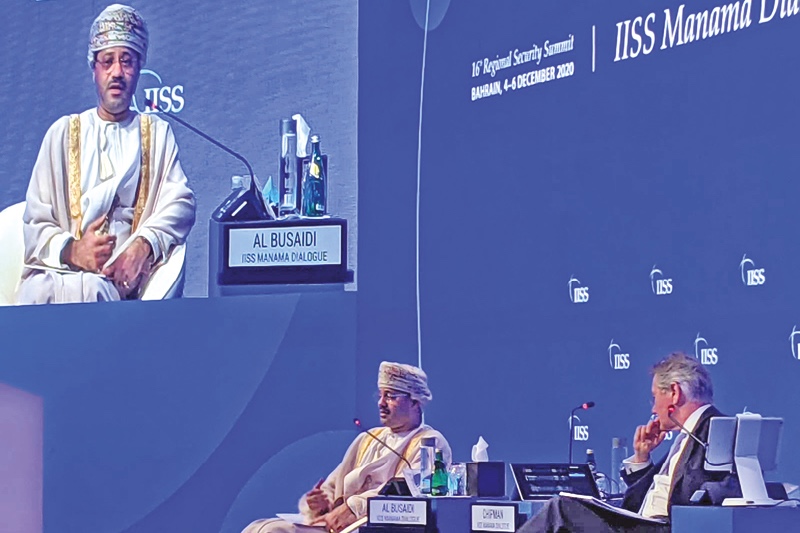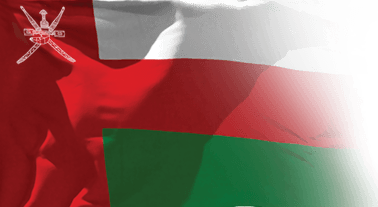
Badr Albusaidi speech to 16th Session of IISS Manama Dialogue in Bahrain
I am delighted to be joining you here in Manama, and I am very grateful to His Majesty King Hamad, to Prince Salman and to the Kingdom of Bahrain.
I am also grateful to my brother Dr Abdullatif A’Zayyani, for the kind invitation and hospitality. And I thank our friend John Chipman and everyone at the International Institute for Strategic Studies for their efforts in continuing to organize the Manama Dialogue, especially under the exceptional circumstances associated with the Pandemic.
First, I would like to pay tribute to Prince Khalifa. 50 years of service, and throughout a shining example to my generation in the Gulf. We will always remember him.
Distinguished delegates, Ladies and Gentlemen.
I have been asked to offer some thoughts on the topic of Middle East security in a global context. In my brief remarks I would like to invite you to consider how two related principles might guide our thought and action on this crucial issue.
These two principles are multilateralism and inclusivity.
They are derived from values that have always informed Oman’s view of the world, and through that Omani foreign policy. We have a profound and enduring commitment to the resolution of conflict by peaceful means.
If we are to avoid misunderstanding, we must maintain engagement and dialogue with everyone, so to have the best possible relations with everyone.
Exclusion rejection or blockades are not in our diplomatic repertoire.
I sincerely believe that it is only by engaging actively, outside of our comfort zone, not just talking to those with whom we are already in agreement, that we can build sustainable security structures in our region.
This is also where the global context counts. For this kind of multilateral engagement to succeed in today’s hyper-connected world, it needs to involve multiple stakeholders, including friends and partners who are not strictly speaking a part of the region, in a geographical sense, but are very much part of it because of the contributions they make here and the interests they have.
Wisdom invites us all to advance cooperation multilaterally and inclusively, and not to lose sight of such values.
There are presently encouraging signs, on a number of fronts, that there is a renewed willingness to resolve some of the difficulties and differences that are threatening regional security.
We welcome the Kuwaiti statement on the positive results of the reconciliation efforts led by His late Highness Sheikh Sabah Al-Ahmad Al-Jaber Al-Sabah, may God rest his soul, and the efforts made by His Highness Emir Sheikh Nawaf Al-Ahmad Al-Jaber Al-Sabah and US President Donald Trump. All these efforts reflect the aspirations of the people of the region. We are optimistic that a permanent understanding can be reached.
It also gives me cause to hope that a renewed American presence in international organisations at a global level will be accompanied by efforts to restore what I still see as one of the most significant American successes in the region in a long time: the Joint Comprehensive Plan of Action.
It will be a positive development for a new climate of inclusivity if a way can be found, collectively, to get more regional parties to this plan more fully and positively involved in it.
Security in a global context – especially when multilateralism and inclusivity are emphasised – also depends upon an environment in which communication and exchange are encouraged.
I think it is easier to enter into multilateral engagement if diplomacy is underpinned by regular interactions at all levels. The better we get to know one another, day to day, the better we will be at working to resolve problems and advancing common interests.
This is why I wanted to say something today about some developments in Omani domestic policy which I very much hope will make a modest contribution to the cultivation of a regional environment in which an inclusive and multilateral approach to regional security can thrive.
These domestic developments are to a very large extent about how the Sultanate of Oman interacts on a day to day basis with our neighbours, and our global partners. They are about the promotion of free exchange – of knowledge and expertise – and they are about opening up the economy in new ways – to more cooperation, more trade and investment, to tourism and much else.
For example, we have plans to extend visa free entry for up to 30 days to citizens of more than 100 countries. There will be significant developments in labour policy which, in the next few weeks, will include the abolition of the no objection certificate system. The electronic transformation that is taking place means we will be cutting back on layers of regulations in order to make doing business in Oman far easier than ever before.
These measures are part of a broader package of economic measures, conceived together in Oman’s Vision 2040 and fiscal policy, which will also involve the introduction of new taxation and an end to some longstanding subsidies. But as the government designs and implements these policies, it is also taking particular care to make sure low income families are properly protected.
Security in the Middle East is nothing without the day to day security of its people. Their security involves not living in fear of poverty, just as much as it means not living in fear of bombs and bullets. Those of us who enjoy prosperity and privilege owe it to our fellow citizens to make the kind of contribution that will guarantee the security of everyone else. Social security is an essential component for successful fiscal policy.
In other words, a solid social fabric at home is an essential foundation for the stable, open, and inclusive economic environment that makes multilateral engagement in the region more successful.
When we consider long term and sustained Middle East security in a global context, we should remain mindful of the big picture in a strategic vision.
We can do this in two ways:
First, expand the conversation to make it as inclusive as possible.
And second, expand the sense of what security means today, to include the everyday security of those whose daily lives depend upon our ability to distribute our collective resources in a manner that is widely perceived, by a strong social consensus, as just and fair.
Thank you.


